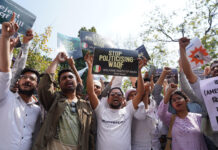A new report has found that Muslims are eight times more likely to be serving time in American jails than non-Muslims.
Civil rights organisation Muslim Advocates said its research shows that within the 34 states that provided data, Muslims are overrepresented in state prisons by a factor of eight relative to the general population.
But in some state systems Muslims are overrepresented by a factor of closer to eighteen, with more than 20 percent of prisoners identifying as Muslim.
The report said: “Prisoners, and Muslim prisoners in particular, have faced multiple hurdles in obtaining basic accommodations for their devotional practices, holidays, burial practices, and religious diet requirements.
“Despite Muslims constituting a significant and growing share of prisoners, many state departments of correction still have policies that are outdated, under-accommodating, or non-accommodating of Muslim prisoners. The most commonly litigated problems were difficulties obtaining an adequate religiously compliant diet, as well as problems worshipping in groups…
“The patterns of arbitrary restriction of Muslim religious practice identified in this report highlight the need to take steps to fix these systemic problems. Prisoners, institutional actors, legislators, and advocates can and should work together to realize the promise of religious liberty for all.”
The report recommends that American prisons should take measures to:
Subscribe to our newsletter and stay updated on the latest news and updates from around the Muslim world!
- Permit individual, group, and weekly congregational prayer, and train officers on how to facilitate this.
- Pre-approve work holidays and allow for additional holiday requests and for religious work exemptions.
- Treat the funerary beliefs of prisoners and their family members with respect, and have clear policies allowing prisoners to indicate their burial beliefs.
- Allow religious head coverings throughout the facility and train officers on how to respectfully search religious garments.
- Provide a halal-designated meal option and not erect unreasonable obstacles to obtaining and maintaining a religious diet.
- Provide access to common religious property, especially Qur’ans, prayer rugs, head coverings, and prayer beads.
- Not strip prisoners of fundamental religious exercise rights as a form of punishment.






















